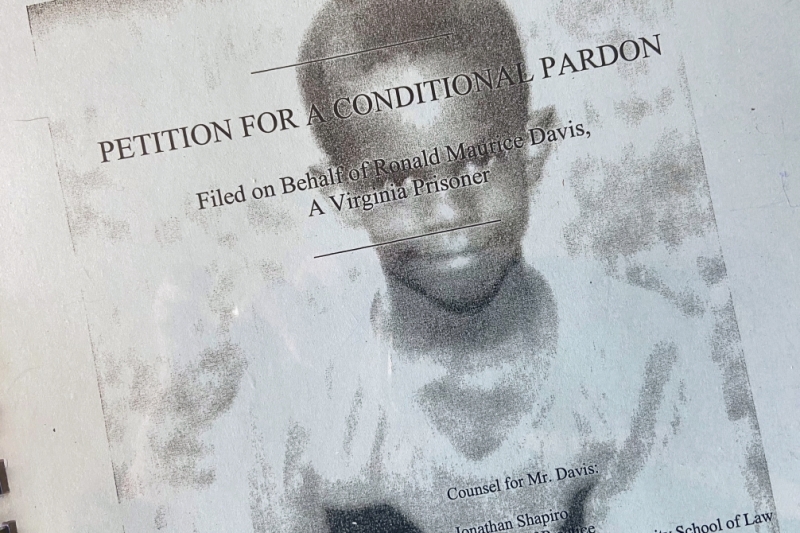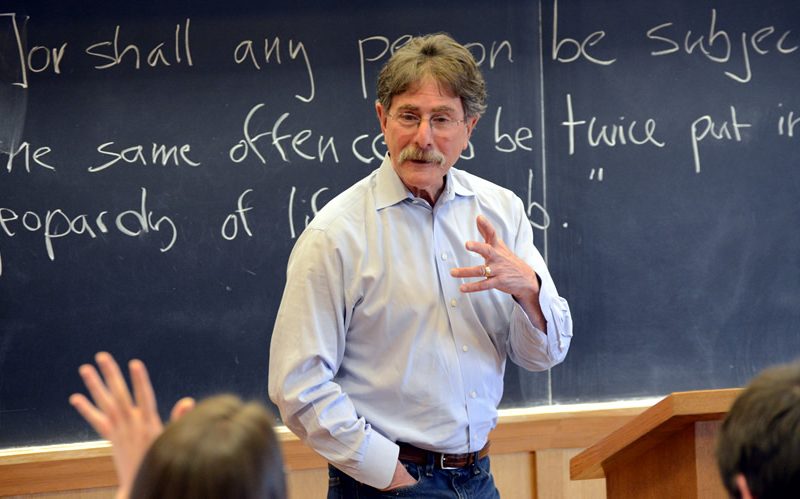W&L Law Professor and Students Win Pardon for Excessive Sentence Ronald Davis was given 80 years in prison—an effective life sentence—for a series of armed robberies where no one was hurt and he never held a gun.
Ronald Davis is guilty of his crimes. And the sentence he received for them is legal. But did the punishment match the crime?
W&L Law professor Jon Shapiro, a criminal defense attorney of national renown, certainly didn’t think so when he heard about the case. Shapiro receives dozens of letters each year from inmates seeking his pro bono assistance. But there was something about Davis’ story that grabbed him.
“This was just one of those cases that seemed so outrageous, so unjust,” he said.
In 1997 at the age of 19, Davis was sent to prison for a series of armed robberies committed over the course of nine days in the Hampton Roads area. No one was hurt during the crimes, and Davis himself never held a gun.
He received an 80-year sentence, roughly four times the typical amount for such a crime. Given his age and the fact that Virginia abolished parole in 1996, Davis would spend the rest of his life in jail.
What complicated matters for Davis was the fact that the crimes occurred in four different jurisdictions, and Davis was convicted and sentenced in each one. Under Virginia’s sentencing guidelines, any prior felony conviction compounds the sentence for subsequent convictions, so each conviction Davis received in one jurisdiction increased the suggested sentence in the following jurisdiction. He received 13 years at sentencing in Norfolk, 15 in Isle of Wight, and 22 in Suffolk. By the time of his final sentencing, in Newport News, the recommended sentence was 30 years.
“Given the facts of the case, the sentence was grossly excessive,” said Shapiro. “And in Virginia, there is simply no other relief but a pardon for someone in this situation.”
Shapiro took on the case in 2017, and later enlisted the help of two law students, Daniel Carlisle ‘19L and Jacob Robertson ‘19L, to help research and assemble the pardon petition document. Carlisle recalled meeting Davis in prison and also visiting with more than a dozen of his family members who stood ready to support Davis should he be released.
“It was impressive that Ron had maintained such close ties with so many members of his family,” said Carlisle. “Most people in his situation can barely find two people who they still have contact with outside of prison after so many years.”
The case Shapiro and the students assembled for parole was compelling. Davis had made the most of his time in prison, completing his GED and numerous skills education certificates, and had set his sights on becoming a paralegal. The parole petition contained letters from Virginia legislators who questioned the fairness of such a lengthy sentence for crimes that resulted in no injuries. One of the prosecutors in the case, Matthew Danielson of Newport News, wrote that he did not believe the sentence Davis received was just given the facts of the case.
“If he were granted clemency today, he will have spent nearly twenty years…in prison. Mr. Davis has more than paid for his crimes. Justice has already been served,” wrote Danielson.
The pardon petition was submitted in May 2019, though Shapiro knew it was likely that a decision would come only towards the end of Gov. Ralph Northam’s tenure, the customary time for governors to grant such requests.
A few days before this past Christmas, Davis and Shapiro learned the petition had been denied. For Dan Carlisle, what followed was as rare as it was expected.
“Most people would have been disappointed that the decision came down that way, and that would be the end of it,” he said. “I am grateful, and I know Ron is, that Prof. Shapiro is the one who had the case.”
After learning of the decision, an apoplectic Shapiro drove straight to Richmond and found the office building for the Secretary of the Commonwealth, Kelly Thomasson, whose job it is to recommend to the governor which pardon petitions to grant or deny. Shapiro was stopped in the lobby by a state trooper on guard who told him he didn’t think Thomasson was there. Shapiro convinced the trooper to send someone to her office to check, and while they waited, Shapiro told the trooper about Davis, the 80-year sentence, and the fight to have him released.
After no one came down to speak with Shapiro, the trooper took his number and said he would try to get someone to contact him. Shapiro returned to his car, and 30 minutes later received a call from the Secretary of the Commonwealth.
Sitting in his car on Broad Street in Richmond, Shapiro made his case anew, pleading for Thomasson to take another look at the file. There was a suspicion, she said, that Davis had been involved in a COVID relief check scam that was running rampant in prisons around the country. Shapiro countered that federal authorities had investigated and decided not to prosecute. Thomasson agreed to reconsider the petition.
Just a few days later, Ronald Davis was granted a conditional pardon, with a release date of December 1, 2023, over 40 years early.
Nearly three years removed from working on the petition, long enough to have spent two years as a prosecutor with the Bronx district attorney’s office and to make the transition to a law firm that handles malpractice litigation, Carlisle describes himself as a “very invested spectator” on the outcome of the Davis case. It highlights, for him, the problems with the criminal justice system.
“This is not a question of innocence—he committed those crimes—but to throw him away and for it to take the sympathetic ear of a state trooper and a pleading law professor the day before Christmas to convince the one person in the Commonwealth who held the entire decision in her hands…. It should never come down to that.
“Professor Shapiro saved Ron’s life. He really did.”
For Shapiro’s part, he hopes his current and future students will take away one important lesson from his role in this outcome and what it means to be a zealous advocate for a client.
“You just don’t give up. You keep going.”
 Davis Pardon
Davis Pardon Prof. Jon Shapiro
Prof. Jon Shapiro
You must be logged in to post a comment.